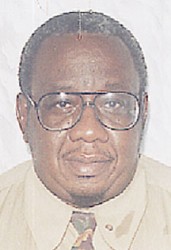A $1 billion fund to examine and test mercury-free gold mining equipment will be activated soon, Chairman of the Board of Directors of the Guyana Geology and Mines Commission (GGMC) Clinton Williams said yesterday.
“We will implement the programme as soon as we put the team in place,” Williams told the bi-monthly meeting of the Guyana Gold and Diamond Miners Association (GGDMA). He said that the $1 billion is intended to support the technological development, fabrication and testing

of prototype plant and equipment and part of this will seek to increase recovery rates of gold and reducing mercury use in the gold recovery process.
Miners cautiously welcomed the proposal yesterday while stressing the need for technology that works.
The project will involve collaboration with the GGDMA and the Institute of Applied Science and Technology as well as the University of Guyana (UG). Miners will also be able to access a portion of the fund to implement mercury-free methods and steps will be taken to develop appropriate financing/funding arrangements that will ensure that realistic interest rates and repayments models are facilitated by the chosen lending institutions, Williams said. He had noted the hesitancy of commercial to commit to the fund with some saying that they were liquid and wanting to charge higher interest rates or a management fee for administering the fund.
Last October, Head of the Presidential Secretariat Dr Roger Luncheon announced that Guyana will begin implementing measures to phase out the use of mercury in mining. “Between 2013 and 2022, Guyana would exercise a phasing in of restrictions against importation and restrictions against the use of mercury in mining,” Luncheon was quoted as saying by the Government Information Agency (GINA). The same month Guyana signed on to the Minamata Convention on Mercury agreeing to ban the production, export and import of a range of mercury containing products by 2020.
Miners have used mercury to separate gold for decades, but part of it is lost in the process, contaminating rivers and soils. The use of mercury, which is toxic to human health and the environment, in gold mining is governed by strict regulations here but compliance is another matter.
Mercury is primarily used to create an amalgam with the gold, and is later heated to separate it. In the process of heating, unless a retort is used, the mercury then enters the atmosphere, and precipitates back into the water, from where it enters the ecosystem, and the food chain. A retort is a closed container, which traps and condenses the mercury vapour without releasing it into the atmosphere.
However, some miners use mercury in sluice boxes which eventually leads to the pits being spiked. This system of mercury use is particularly dangerous, as it introduces mercury directly into the water system. Countries such as the United States and the European Union have already banned the export of mercury.
GINA had reported that the Ministry of Natural Resources and the Environment was working closely with the GGMC to look at ways through which miners can be further incentivised for incorporating mercury-free technologies into their practices.
At yesterday’s meeting, President of the GGDMA Patrick Harding had called for clarification as to whether the fund was a loan or grant and Williams clarified that it was a revolving fund.
Miners, meantime, expressed concern at the activities at the Bartica office of the Guyana Gold Board which was closed last week amid a probe into gold tampering during gold sales there. “It’s very disturbing,” said Charlie Da Silva. He added that they hope that the fraudulent activities will be investigated properly and action will be taken against those involved. “We want to see some action,” chair of yesterday’s meeting Edward Shields said while noting that they had assisted with investigations before and no action was taken.
Williams promised that he would raise the concerns with Minister of Natural Resources and the Environment Robert Persaud. He also spoke of his vision for the sector and where he would like it to go.
Miners raised several concerns including access to foreign currency which has been severely curtailed. Previously they were able to get paid in foreign currency but now only up to 10% is paid in foreign currency for their gold sales, they said.




